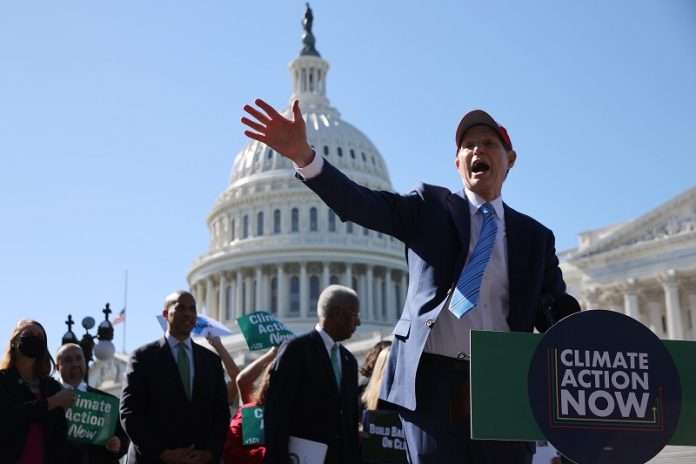It should be common knowledge by now that climate change is a complex problem with outsize consequences for the Global South. By 2030, most Small Island Developing States (SIDS) will lose up to 100 percent of their GDP to climate disasters. Similarly, Africa’s 54 countries will suffer some of the worst consequences of a warming planet, even though they are least responsible for the crisis, contributing less than 4 percent of global greenhouse-gas (GHG) emissions.
Rising temperatures are likewise threatening life in the Arab world, resulting in water scarcity in Jordan and extreme heat waves in the Gulf countries. The need for a great transformation at the regional, as well as the global, level was one of the main reasons why Egypt hosted last year’s United Nations Climate Change Conference (COP27), and why the United Arab Emirates will host this year’s meeting. In preparation for COP28, which will convene in Dubai in November and December, the UAE has committed to engaging in open and honest discussions with everyone to ensure that the conference is a success.
Building on its strategic decision to promote and invest in renewables, conservation, and climate technology, the UAE selected Sultan Al Jaber as the COP28 president-designate. The choice has received ample attention: in addition to being the chairman of Masdar — the world’s first carbon-neutral city and home to the International Renewable Energy Agency — and the minister of industry and advanced technology, Al Jaber is managing director and group CEO of Abu Dhabi National Oil Company.
Accelerating climate action, meeting the challenges of the energy transition, and maintaining the world’s demand for oil must be addressed comprehensively. Recognizing this reality, the UAE has chosen as its official to oversee talks, someone who has extensive experience in renewable-energy projects, as a special envoy for climate change, and in positions responsible for reducing industrial emissions. Global warming is a complicated problem, and solving it calls for sophisticated solutions requiring the expertise of specialists in a wide variety of fields.
A small but loud group of politicians in the United States and Europe, together with some activists, have questioned why an ‘oil executive’ is leading COP28. Many of these policymakers insist on reducing climate negotiations to a zero-sum game. By distracting people from the challenge of implementing realistic climate solutions and focusing instead on Al Jaber’s appointment, they seem to view the fight against global warming as a political stick to wield, rather than a global imperative that requires close collaboration.
Last week, members of the US Congress and the European Parliament sent a letter to US President Joe Biden, European Commission President Ursula von der Leyen, and UN Secretary-General António Guterres urging the removal of Al Jaber as COP28 president-designate. Their demand was not based on any wrongdoing or a lack of commitment to the role, but rather was a means to score political points at the expense of a united global effort to tackle climate change and maintain economic growth.
Legislators should ensure the best possible outcomes for their constituents and their children, not embrace positions based on political biases without any effort at genuine engagement. Worse still, the US and European legislators are advocating international intervention in a sovereign decision — the latest in a long line of Western efforts to dictate to Global South governments for domestic political gain.
Moreover, the tendency to prescribe policy solutions to Global South countries — which are often the worst hit by climate change and have endured injustice after injustice, including colonialism and resource extraction — is widening the gap between approaches to global warming. Emerging economies like China and India must balance climate action with the need to provide economic opportunities for billions of people.
Nonetheless, both China and India have invested substantially in climate mitigation and adaptation, and China has developed the world’s largest capacity to manufacture and deploy renewables. The two countries lead globally in solar and wind capacity and have deployed more than 40 percent of the world’s new solar and wind capacity each year since 2017. Fossil-fuel consumption continues in China and India, as it does worldwide, but has been reduced from 96 percent to an average of 83 percent of the total across both countries. With nearly three billion people between them, China and India are among the largest and fastest-growing economies in the world; their needs cannot be ignored.
The same legislators lecturing sovereign states about how to navigate climate policy seem to forget that the US and Europe are responsible for the majority of historic emissions. Rather than interfering in decision-making by countries committed to climate action, they should be exerting pressure on their own governments to live up to their climate commitments. Currently, the US and Europe are expanding their own fossil-fuel infrastructure and failing to contribute substantially to internationally agreed funds to mitigate the effects of climate change. The United Kingdom has announced its first new coal mine in 30 years, while Germany has resurrected or extended the lives of at least 20 coal-fired power plants.
Any discussion about the energy transition requires nuance and a sincere commitment to joint action. But that is impossible when certain politicians are more committed to catchy soundbites and making a name for themselves. The world has largely agreed on the need to reduce GHG emissions. We cannot let a minority change the framing of the problem and, in the process, slow momentum. The climate crisis is real, as is the political drama that impedes tangible and practical solutions. We must avoid the trap of division and distraction if we want to address global warming before it is too late.
 Ali Rashid Al Nuaimi
Ali Rashid Al Nuaimi
Member of the United Arab Emirates Federal National Council and Chairman of the Defense, Interior, and Foreign Affairs Committee at the Council.
Copyright: Project Syndicate, 2022.
www.project-syndicate.org

















